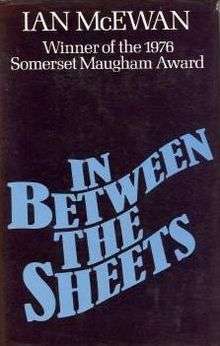In Between the Sheets

In Between the Sheets (1978) is the second collection of short stories by British writer Ian McEwan.
Context
The collection is McEwan's second book and second collection of short stories, and was regarded by the author (along with his first collection, First Love, Last Rites) as an opportunity to experiment and find his voice as a writer. In an interview with Christopher Ricks in 1979, McEwan commented, "They were a kind of laboratory for me. They allowed me to try out different things, to discover myself as a writer."
Stories
- "Pornography" is about a two-timing pornographer. His lovers eventually trap him and tie him to the bed. The story ends as the women prepare to castrate him in revenge for his having (so they allege) passed on venereal disease to them.
- "Reflections of a Kept Ape" appears to show a relationship of bestiality between a writer and her ape, seen from the point of view of the 'ape'. No dialogue is spoken.
- "Two Fragments" gives a post-apocalyptic view of a ravaged London through the eyes of a father caring for his young daughter in a collapsed society.
- "Dead As They Come" tells of a wealthy businessman's bizarre obsession with a fashion mannequin, which he purchases and takes home with him.
- "In Between the Sheets" tells of a father's suspicions about his teenage daughter's relationship with her older midget girl-friend.
- "To and Fro"
- "Psychopolis" tells of a British traveller's growing sense of ennui as he travels across America, culminating in an unusual dinner party.
Reception
The book was enthusiastically received by critics. In The Times, Caroline Moorehead asked in her headline, "Who Else But Ian McEwan Would Put a Lover in Ape's Clothing?"[1] In The New York Review of Books, Robert Towers praised McEwan's "quiet, precise, sensual touch," calling him "a writer in full control of his materials" and describing his England as a "flat, rubble-strewn wasteland, populated by freaks and monsters, most of them articulate enough to tell their own stories with mesmerizing narrative power and an unfaltering instinct for the perfect, sickening detail."[2] In the Washington Post, Terence March described McEwan's prose as "clear as a windowpane," and ranked the author as "a gifted storyteller and possibly the best British writer to appear in a decade or more."[3]
A year later, again in The New York Review of Books, writer and critic V.S. Pritchett gave a good sense of the stories' impact: "Ian McEwan has been recognized as an arresting new talent in the youngest generation of English short story writers. His subject matter is often squalid and sickening; his imagination has a painful preoccupation with the adolescent secrets of sexual aberration and fantasy. But in his accomplishment as a story writer he is an immediate master of styles and structures, his writing transfigures, and he can command variety in subject and feeling. His intellectual resources enable him—and the reader—to open windows in a claustrophobia which otherwise would have left us flinching and no more. Invention, irony, humor, a gift for satirical parody and curiosity give him the artist’s initiative. We do recognize an underworld—for that is what it is—and it is natural that he has evoked an, albeit distant, connection with Beckett and Kafka. His limitation is that his range of felt experience is confined to his love of his disgusts."[4]
References
- ↑ Caroline Moorehead, 'Who Else But Ian McEwan Would Put a Lover in Ape's Clothing', The Times, 14 January 1978
- ↑ Robert Towers, "In Extremis," The New York Review of Books, 8 March 1979. In the same review, he classes McEwan's First Love, Last Rites as "possibly the most brilliantly perverse and sinister batch of short stories to come out of England since Angus Wilson's The Wrong Set."
- ↑ Terence Winch, "Writing on the Razor's Edge," Washington Post Book World, 5 August 1979.
- ↑ V.S. Pritchett, "Shredded Novels," The New York Review of Books, 24 January 1980.
- Ryan, Kiernan: Writers and their Work: Ian McEwan (1994, Northcote House)